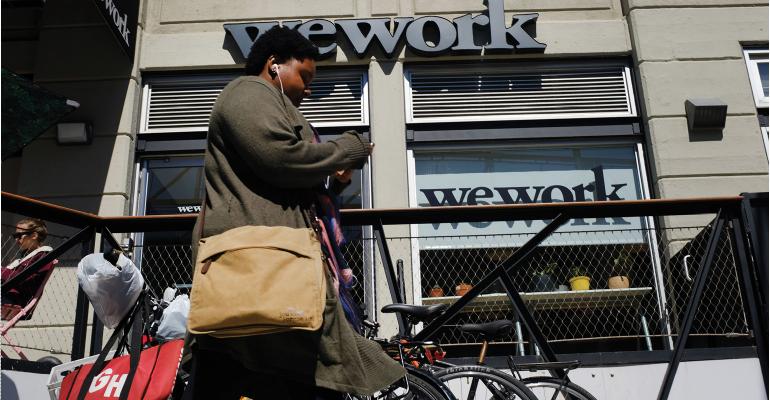(Bloomberg)—WeWork Cos. disclosed its plans for an initial public offering, revealing a net loss of $690 million in the first six months of this year as it moves toward a fall listing that will test investors’ appetite for money-losing startups.
Revenue in the first-half more than doubled to $1.54 billion, the U.S. Securities and Exchange Commission filing showed. The company plans to list shares under the symbol “WE,” although the exchange wasn’t listed.
One of the main risk factors the company highlighted on Wednesday was its “ability to achieve profitability at a company level in light of our history of losses.” Chief Executive Officer Adam Neumann faces persistent questions about WeWork’s propensity to burn cash. The company has described some of its more scrutinized expenses, including a flashy contest series that cost more than $40 million, as “critical means through which we express our key values.”
In an unconventional move, there will be three classes of common stock at WeWork: Class A shares with one vote each, plus “high-vote stock” in the form of Class B and Class C shares.
The office-rental company listed an offering size of $1 billion, which is typically a placeholder that will be revised when terms of the share sale are set later. WeWork had been targeting a share sale of about $3.5 billion in September, people familiar with the matter have said. That would make it the second-biggest IPO of the year, topped only by Uber Technologies Inc.’s $8.1 billion listing in May. In parallel with the stock offering, WeWork has been in talks to raise as much as $6 billion in debt.
JPMorgan Chase & Co. and Goldman Sachs Group Inc. will be the lead underwriters on the offering. Executives from major banks had been courting the company for years.
Debt Levels
WeWork’s annual revenue more than doubled to $1.8 billion in 2018 compared to $886 million in the previous year. The full-year net loss attributable to the company widened more than 80% to $1.6 billion, from a loss of $883.9 million in 2017. It lost about $430 million in 2016.
The company said it could one day be profitable if it “stopped investing in our growth and instead allowed our existing pipeline of locations to mature.” WeWork said only 30% of its open locations are mature and that 70% of its locations had been open for two years or less. It also has a revenue backlog of $4 billion, eight times its backlog last year, it added.
New York-based WeWork, which leases office space to companies and freelance workers, has raised more than $12 billion in funding since its founding. SoftBank Group Corp. is the company’s largest backer and has valued the unprofitable business at $47 billion. WeWork is by far the most valuable co-working business, though numerous rivals around the world are trying to lure away members.
WeWork -- which changed its name to the We Co. in a diversification move earlier this year -- has in recent weeks been looking to raise a significant amount of debt. It was seeking to borrow $2 billion through a letter-of-credit facility and $4 billion from a delayed-draw term loan, Bloomberg previously reported. Banks will have to make good on their commitments only if at least $3 billion is raised in the IPO. It confirmed in the filing that it entered into a commitment letter this month for a credit facility of as much as $6 billion.
--With assistance from Michael Hytha, Drew Singer, Gillian Tan and Sonali Basak.
To contact the reporters on this story: Liana Baker in New York at [email protected];
Ellen Huet in San Francisco at [email protected].
To contact the editors responsible for this story: Liana Baker at [email protected]; Mark Milian at [email protected]
Ben Scent, Amy Thomson
© 2019 Bloomberg L.P.





